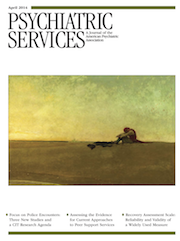To the Editor: Despite advances in Internet technologies, the extent to which adults with severe mental illness have access to and use these technologies remains unclear. The Internet has become an important portal for various activities and is becoming an integral part of health care. For example, the U.S. Department of Veterans Affairs (VA) has implemented an online health care record system for patients to access and interact with their health care providers. A national study found that veterans who use VA mental health services are not less likely to use the Internet than other VA service users or veterans who are users of non-VA services (
1).
We conducted a study comparing the prevalence of Internet use in a local sample of 210 veterans with severe mental illness and in two other samples—a nationally representative sample of 8,710 veterans who participated in the 2010 National Survey of Veterans (NSV) (
2) and subset of 705 veterans in the 2010 NSV who were users of general mental health services.
The 2010 NSV was a mailed, self-administered questionnaire that used address-based sampling. Data for veterans with severe mental illness (for example, schizophrenia, bipolar disorder, and major depression) were based on a convenience sample from a psychosocial rehabilitation center at the VA Connecticut Healthcare System from July to December 2012. In both samples, veterans were asked about their use of the Internet and e-mail and their willingness to use the Internet for various activities.
When the analysis controlled for sociodemographic differences, veterans with severe mental illness were significantly less likely to use the Internet than the general population of veterans (57% versus 71%) and the sample of users of general mental health services (74%). Veterans with severe mental illness were also less likely to use the Internet at home, work, and school but were more likely to use it at a public library or community center. Veterans with severe mental illness were also significantly less likely to use e-mail than the general population of veterans (48% versus 67%).
There were no group differences in willingness to use the Internet for obtaining news and information, obtaining research on services, purchasing goods or services, responding to polls or surveys, and obtaining information about or applying for VA benefits. Overall, veterans were “somewhat willing” to “very willing” to use the Internet for nearly all of these activities.
These findings suggest there may be a “digital divide” between veterans with severe mental illness and veterans in the general population, which may ultimately lead to disparities in access to health care as health information, interactions with health care providers, and computer-based therapies become increasingly available on line (
1,
3). A large majority of veterans with severe mental illness reported using the Internet at public libraries and community centers rather than at home as other veterans did, suggesting that lack of ability to pay for Internet access may be a barrier. Despite group differences in Internet use, veterans overall were willing to use the Internet for many activities, suggesting that the Internet has great potential as a portal for providing psychoeducation, reducing stigma related to mental health services, and possibly empowering veterans with severe mental illness to be more engaged in their health care.
Acknowledgments and disclosures
Material support was provided by the U.S. Department of Veterans Affairs, Veterans Health Administration, Office of Research and Development. The views presented here are those of the authors alone and do not represent the position of any federal agency or of the U.S. government.
The authors report no competing interests.

